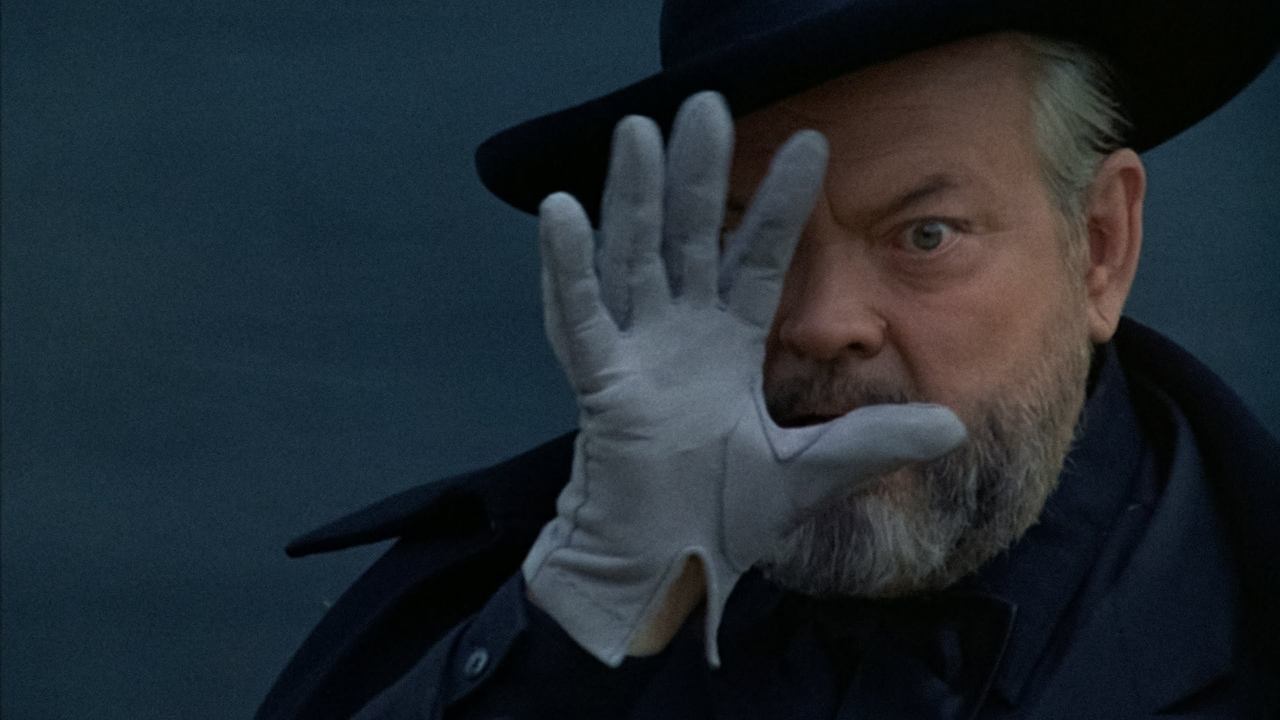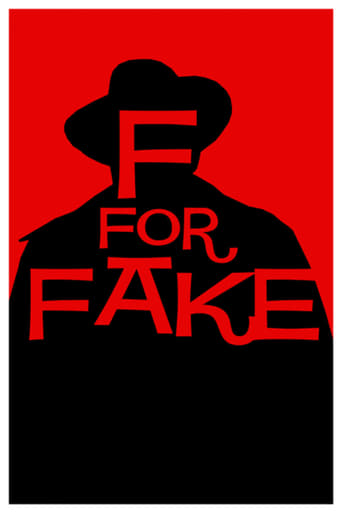

Orson Welles had a tough career. After his masterpiece, as if I need name it, was stiffed at the Oscars due to Hearst's pressure, and his follow-up, the Magnificent Ambersons, was mutilated by the studio. From there on in, his films were often either play-safes that brought nothing of great importance to the table (The Stranger) or never brought anything at all (the infamous Don Quixote project.) His career had unquestionably been knee-capped by the Hollywood system, but with a new film, he was confident that he could outwit them.He made a documentary film on a shoestring budget, but perhaps it's a stretch to call this a "documentary." It feels like some sort of grand experiment in pushing the boundaries of all genres. To be honest, it's practically impossible to even confine it to one genre. It discusses fictitious events in an honest mood, so it isn't really a documentary, but it explores real people and their lives. The Criterion describes it as "Virtual Reality," which is probably the definition we should choose.The film is primarily about the career of Elmyr, a Hungarian refugee who creates phony paintings by famous artists, before selling them off to dealers for tens of thousands. His biographer is just as duplicitous, best known for his yarn about writing a Howard Hughes autobiography with the man's help, which also fooled the experts, for whom Welles mocks the entire duration. Elmyr is breathtaking in the easiness of his misdeeds, effortlessly recreating Picasso in 10 seconds. But to describe this as a documentary about these two people is like describing Citizen Kane as a film about newspapers. Welles's barely concealed adoration of these two is the basis of an entire film which praises trickery and deceit, which he likens to the film industry in general.The film's bedrock is the sheer passion that Welles puts into the film, with a voice that always rings of a smile, and a pleasant ambiance that never let's up. His editing underscores that with his powerful cutting, and his own "biographical" insights. There's something incredibly comfortable simply in watching Welles sit at a chair in a film editing room, explaining Elmyr's life trickery. Soon, we realise that even he seems to love playing tricks on us, and we quickly realise that we have our own unreliable narrator, who seems to enjoy the topic of his film so much that he needs demonstrate it.One never knows where the truth begins, and lies end. Welles makes us realise the absurdity pervading art, where one man can decide whether a painting should be worth 10 thousand or 10 bucks, simply because it was done by another person. If they are both masterpieces, why should they be priced different? This is ultimately the reason Elmyr is doing his story in a jail cell, since no dealer would dare take the stand, and admit himself a fool. One can tell Welles is siding based on his own stand-off with the Establishment, and he can see a little of himself in Elmyr, who he jokes around with.Ultimately, the film leaves more questions than when we began. Distorted editing forms a false impression of scenes, fictitious stories are presented as fact, and the truth blends effortlessly with fraud. Yet we don't know the difference lest Welles reveal it to us, ultimately proving Tom Clancy's point that fiction has to make sense, and reality doesn't.
... View MoreFirst of all, it needs to be said that F For Fake is an entertaining film as quick witted as it is briskly edited and strongly featuring Orson Welles on superb form. The bulk of the film concerns the art forger Elmyr de Hory in a separate documentary made for the BBC in 1970 by François Reichnbach. But Welles' overdubbed introduction, his re- worked edition of Reichenbach's work and the tumbling, fragmented overlaid additions including those of his girlfriend Oja Kodar and the hagiographically soft-focused Chartres cathedral turn this into an extended solipsism of what counts as 'real'. The art 'forgeries', driven by the market might not have been forged by the artist but by the dealer - and of course, works that have been on gallery walls for years are now the art anyway. The most famous artist of them all, Pablo Picasso, is quoted as denying his own work with 'even the real Picasso can make a fake Picasso' before the film dissolves into a dubious narrative about how Oja duped the artist into producing an entire period of his own work that retrospectively he couldn't claim. All the while, Welles brings up moments in his career in his steady, articulate, confiding drawl, reminding us that he started as famous and everything declined from there - the same trajectory of fame as that 'enjoyed' by the builders of Chartres cathedral, a totem of civilisation whose provenance is entirely irrelevant. The whole film is quick, colourful, sexy and fun and rendered even more so by the light but cultured jazz touch of Michel Legrand. 7/10
... View MoreF for Fake (1973)** 1/2 (out of 4) Orson Welles' final major picture started off as a documentary on art forger Elmyr de Hory but when that project led to an interview with Clifford Irving, the man who wrote the fake Howard Hughes biography, the documentary took a new turn and decided to look at fakes all around. This really isn't your typical documentary and many critics of the film will say it makes very little sense and all in all is nothing more than an incoherent mess. I wouldn't go that far but I think F FOR FAKE is certainly more style than actual substance. I say that because Welles visual style here is something that you didn't see in documentaries at the time and I'd say that nothing that followed really looked the same. The documentary has an avant garde feel to it and most of them comes from the editing. The editing goes all over the place with all sorts of weird edits, different styles of cameras being used and the editing usually takes the story and tells it in a different time frame and I think this is where people get lost. The look of the film is certainly something impressive and you really can turn the volume down and be entertained just by the look that Welles made. However, this "style" is so good that it really takes away from the stories being told and I think it really kills most of the interest in the subjects. I think the way the story goes back and forth does make the film incoherent but this is also due to the fact that the material just isn't worth following. I think had Welles made a more traditional documentary then the story would have been more entertaining. As is, the story just gets lost in the style and in the end you really don't learn anything about either man. We even get a quick clip about The War of the World hoax that landed Welles not in jail but in Hollywood. What actually keeps the film entertaining is the performance of Welles being himself and hosting. He comes off so good and charming that it at least keeps you awake even when the story itself goes under. F FOR FAKE is considered by some to be horrid while others see it as another Welles masterpiece. I'm in the middle thinking it shows some signs of greatness but in the end it's just too rough around the edges to really work.
... View MoreOrson Welles's final completed movie deals with fakery, and in particular with two of the most notorious forgers of the twentieth century. "F is for Fakes" (also called "F for Fake") is not really a movie or documentary as much as a look at how we interpret art, and what we WANT to interpret about anything that is essentially fake. Welles proudly calls himself a charlatan while performing magic tricks and coming up with all sorts of ways to play with the audience. I personally had never heard of Elmyr de Hory until watching this, but Welles turns him into a very interesting person.All in all, the director known as a boy genius had a fine end to his career. Welles created a truly mind-bending look at the concept of art. The fact that the movie came out around the time that Clifford Irving's scandal broke (he wrote a forged biography of Howard Hughes) certainly adds to the documentary's quality. Can there truly be any more definite reality left in the world?
... View More